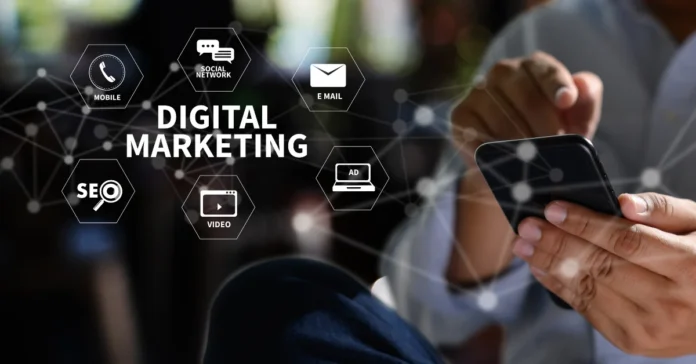Discover the world of digital marketing with “The Ultimate Guide to Digital Marketing.” Perfect for business owners, marketers, students, and anyone keen on improving their skills, this guide shares the newest tricks and trends in digital marketing.
- Cost-effective & Measurable: Saves money compared to traditional methods and lets you track results for better optimization.
- Targeted & Global: Reaches the right people anywhere in the world, not just locally.
- Engaging & Brand-Building: Connects directly with customers and builds brand awareness.
Ready to boost your digital marketing skills?
What Is Digital Marketing?
A type of marketing used to advertise and sell goods and services online is called digital marketing. and email to connect with the people you want to.
Using online marketing strategies like email, social media, and search marketing to sell and promote goods and services is known as digital marketing.
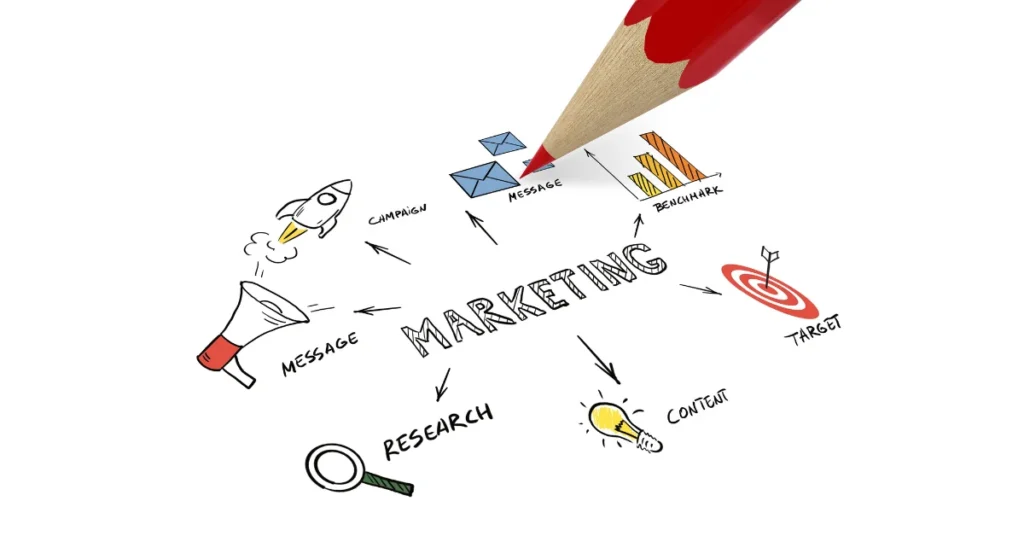
Why Is Digital Marketing Important?
Compared to traditional marketing strategies, digital marketing can help businesses reach a larger online audience and boost visibility at a lower cost. Today, interacting with potential customers where they spend the majority of their time is only possible through digital marketing.
Additionally, companies can swiftly adjust to shifting market conditions or customer demands thanks to the flexibility of digital marketing, which gives them a competitive edge in their sector.
By leveraging effective technologies and methods, digital marketing enables firms to access a global client base and penetrate markets outside their local area.
Types of digital marketing
- Affiliate Marketing
- Search Engine Optimization (SEO)
- PPC Marketing
- Content Marketing
- Social Media Marketing
- Email Marketing
- Video Marketing
- Influencer Marketing
Affiliate Marketing
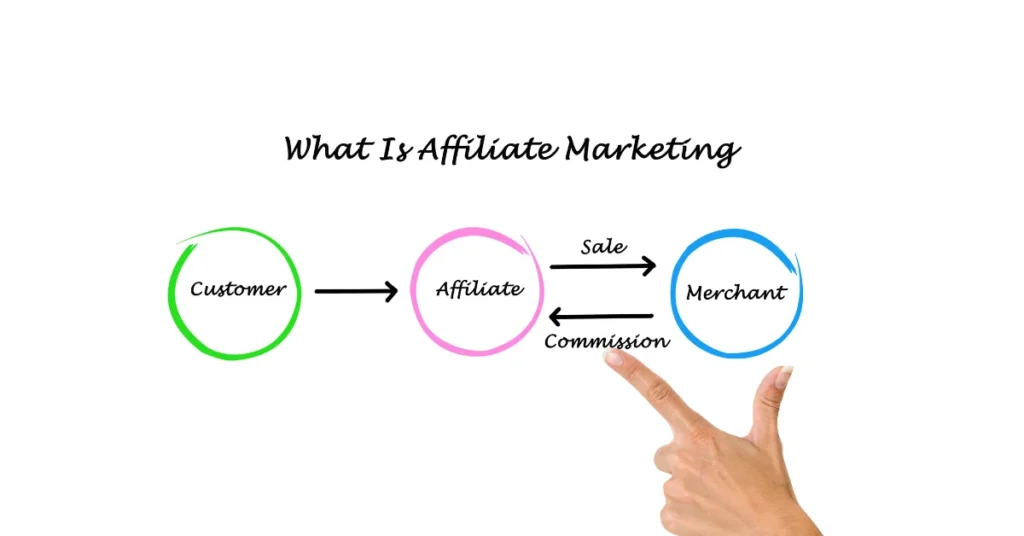
One of the earliest types of marketing that has expanded significantly with the use of the Internet is affiliate marketing. There are two ways to include affiliate marketing in a digital marketing plan.
One way is to work together with other companies or individuals to promote your products or services, and you give them a commission in return. In simple terms, this leads to more sales of your products and more people recognizing your brand.
Your partners can help you make more money, become excellent representatives for your brand, and convince others to buy from you or reach out to your business.
Selling goods from other companies on your website and getting paid a commission for each sale is the second method. Put another way, you can profit from selling other things by leveraging your traffic and users’ confidence.
Visit our thorough affiliate guide for step-by-step directions on how to get started as well as real-world examples of how affiliate marketing operates.
Search Engine Optimization (SEO)

You can improve your website’s content and search engine ranking by using SEO (search engine results pages, or SERPs).
This will be a fantastic chance for you to connect with your target market as they look for details, goods, and services associated with what you have to offer.
In a digital marketing campaign, SEO can be used to raise brand awareness, boost conversions, and bring in more organic website traffic.
Many types of SEO are there. The most important is:
- Technical SEO
- On-Page SEO
- Off-Page SEO
PPC Marketing

Displaying paid advertisements to your target audience on search engines, social media platforms, or other websites is known as pay-per-click, or PPC, marketing.
PPC marketing offers the advantages of speedy results, enhanced brand awareness, and focused targeting. PPC advertising can be used to improve website traffic, lead generation, and sales in a digital marketing campaign.
Advertising on Google, Bing, Linkedin, Twitter, Pinterest, and Facebook can be set up through PPC campaigns, which display your ads to users who are searching for terms associated with your goods or services.
PPC campaigns can divide users into groups according to their location or specific interests, as well as demographic traits like age and gender. You pay the provider a fee each time a user clicks on one of your ads; this is why the term “pay per click” originated.
Search Engine Marketing (SEM) is comprised of PPC campaigns and SEO.
Content Marketing
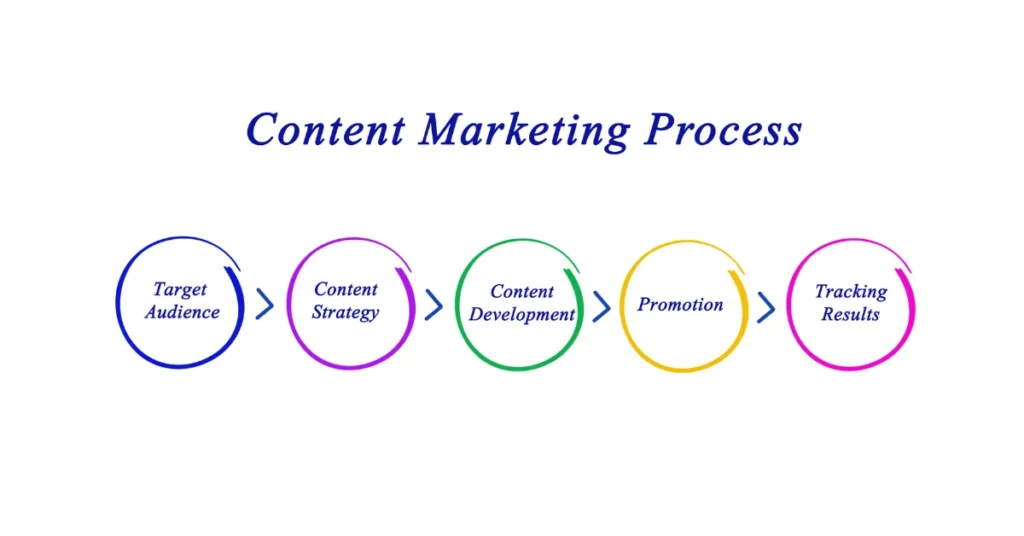
Search engines LOVE content. They want compelling content, relevant to the searcher, frequently updated, and full of enrichment.
Researching keywords, crafting articles, refining the descriptions of goods and services on your website, and producing instructional content are all part of content marketing, which aims to encourage readers to get to know your business better.
Businesses can convey marketing messages using a range of formats thanks to content marketing.
Blog posts, knowledge base articles, support documents, white papers, case studies, and other comparable content resources are all included in content marketing.
Social Media Marketing
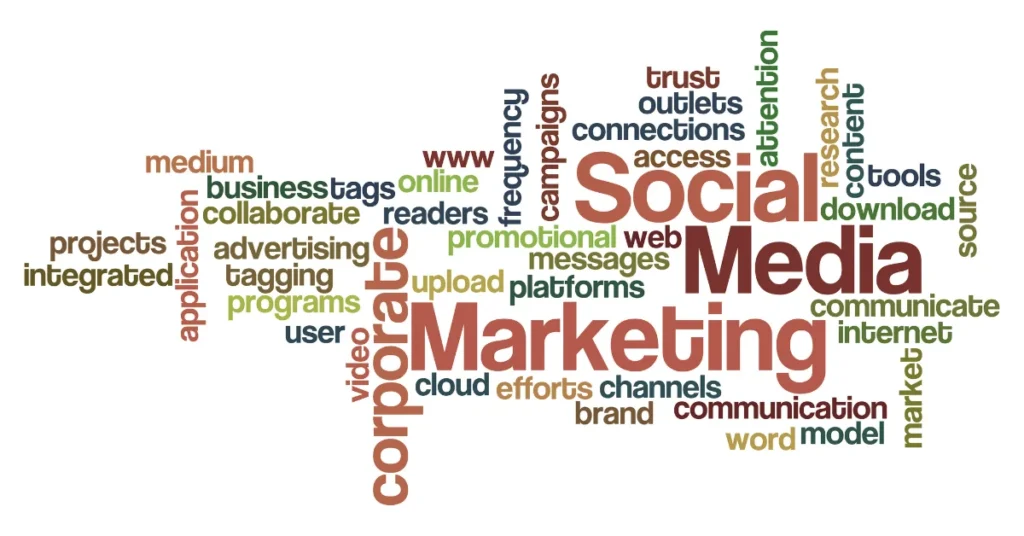
Social media marketing allows businesses to reach their customers on channels like Facebook, Instagram, LinkedIn, Twitter, Pinterest, and TikTok.
Social media marketing can be used in a digital marketing campaign to connect with your target audience, build a community around your brand, and drive website traffic.
Email Marketing
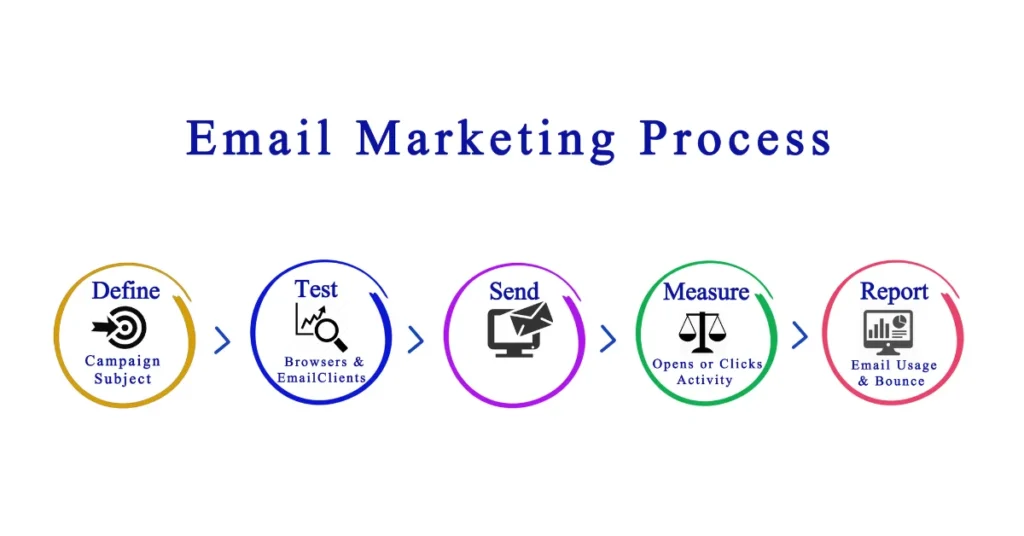
Email marketing allows businesses to reach people who have consented to receive marketing messages by email. Businesses can collect emails on their website, blogs, and social media channels.
Email marketing can be used to Generate leads, promote products, and increase customer retention in a digital marketing campaign when it is properly planned and done with the intention of not bombarding people with unsolicited emails.
Reaching out to individuals who are interested in your brand or who are potential customers can be accomplished through email marketing, provided that you are not invading their inboxes and that they genuinely want to hear from you.
Video Marketing

Video marketing allows businesses to reach their audiences with video content. In most cases, this is achieved via YouTube and other video hosting services.
According to 78% of video marketers surveyed for Wyzowl’s State of Video Marketing report, video increased sales. The average amount of time spent on a website is increased by video, according to 83% of video marketers, and website traffic is increased by 86% of them.
Fill your content library with videos, share them as part of your social media campaigns, and promote them as part of your link-building assets.
Influencer Marketing

Influencer marketing allows businesses to reach new audiences through popular social media users. Brands campaign with celebrities online to market products via sponsored and paid partnership posts.
Millions of people visit video platforms every month to watch videos for leisure, education, or just to help them decide what to buy.
Including video in your SEO, content, and social media marketing campaigns is the best way to maximize the impact of video marketing.
The benefits of digital marketing
Digital marketing offers numerous advantages for businesses of all sizes, positioning itself as a vital element in modern marketing strategies. Here are some key benefits:
Reach and Targeting
- Global Reach: Unlike traditional marketing methods, digital marketing transcends geographical boundaries. It enables reaching a global audience with minimal investment, unlocking opportunities in new markets and customer segments.
- Targeted Audience: Digital marketing allows for precise targeting, facilitating connections with individuals most likely to be interested in your products or services. Utilizing demographics, interests, online behavior, and other factors helps customize messages for specific audiences.
Cost and Measurement
- Cost-Effective: Digital marketing campaigns are significantly more cost-effective compared to traditional methods. Various budget-friendly strategies, such as social media marketing, email marketing, and content marketing, provide flexible options.
- Measurable Results: Digital marketing provides valuable data and insights into campaign performance. By tracking metrics like website traffic, engagement rates, conversions, and return on investment (ROI), you can measure campaign effectiveness and optimize for better results.
Engagement and Brand Building
- Increased Engagement: Digital marketing fosters interactive communication with the audience. Direct interaction through social media, email, and other channels strengthens relationships and cultivates brand loyalty.
- Brand Building: Establishing a robust online presence and positioning your brand as an industry thought leader is achievable through digital marketing. Delivering valuable content and engaging with the audience helps in building brand awareness and trust.
In summary, digital marketing empowers businesses to connect with their target audience in a cost-effective, measurable, and engaging manner. It stands as a valuable tool for achieving marketing goals and gaining a competitive edge in today’s digital landscape.
How to create a digital marketing strategy
Creating a successful digital marketing strategy necessitates a structured plan.
- Define Your Goals and Objectives: Set SMART Goals: Establish Specific, Measurable, Attainable, Relevant, and Time-bound goals. Clearly define what you want to achieve with your digital marketing efforts, be it increasing brand awareness, generating leads, or boosting sales. Align with Business Objectives: Ensure your digital marketing goals align with broader business objectives.
- Know Your Audience: Develop Buyer Personas: Create detailed profiles of your ideal customers, considering demographics, interests, online behavior, and pain points. This understanding allows for effective tailoring of messaging and content. Conduct market research: Utilize various methods like surveys, interviews, and social media listening to gain insights into your target audience’s preferences and online behavior.
- Choose the Right Channels: Evaluate Different Options: Explore various digital marketing channels such as search engine optimization (SEO), social media marketing, content marketing, email marketing, and pay-per-click (PPC) advertising. Prioritize Based on Audience and Goals: Consider the channels frequented by your target audience and align them with your goals. For instance, LinkedIn may be suitable for reaching professionals, while Instagram might be better for a younger audience.
- Create Valuable Content: Develop a Content Strategy: Plan the type of content you’ll create (e.g., blog posts, infographics, videos) and how you’ll distribute it across different channels. Focus on Quality and Value: Ensure your content is informative, engaging, and addresses the needs and interests of your target audience.
- Analyze and Refine: Track Your Results: Continuously monitor your campaign performance using relevant metrics aligned with your goals. Utilize tools like Google Analytics and social media insights for valuable data. Adapt and Improve: Based on your data analysis, identify what’s working and what needs improvement. Be ready to adjust your strategies and tactics as needed, optimizing your digital marketing efforts for sustainable success.
Remember, while this serves as a general framework, specific steps may vary based on your unique business and goals. By adhering to these core principles, you can develop a robust digital marketing strategy that propels your business forward in the digital age.
The Future of Digital Marketing
The future of digital marketing is anticipated to be a dynamic landscape shaped by evolving technologies, consumer behaviors, and preferences. Here’s an overview of some key trends that are likely to shape the future:
1. Rise of Artificial Intelligence (AI): AI is expected to play an increasingly significant role, from personalizing marketing campaigns and content to automating tasks and generating insights. This will include:
- AI-powered chatbots: Providing 24/7 customer support and personalized recommendations.
- Predictive analytics: Enabling targeted advertising and content based on individual preferences and behaviors.
- AI-generated content: Creating personalized content and marketing materials at scale.
2. Continued Growth of Influencer Marketing: Consumers place trust in recommendations from individuals they follow online. Influencer marketing is expected to:
- Expand beyond traditional celebrities: Micro-influencers with smaller, highly engaged followings are likely to gain even more traction due to their perceived authenticity and relatability.
- Embrace new platforms: As new social media platforms and features emerge, influencers will leverage them to connect with audiences in innovative ways.
- Focus on building trust and transparency: Collaborations will likely be built on brand alignment and genuine connections to resonate better with audiences.
3. The Metaverse and Beyond: As the metaverse and other immersive technologies evolve, expect to see:
- Virtual and augmented reality (VR/AR) experiences: Offering interactive brand engagement and product exploration opportunities.
- Evolving shopping experiences: Integrating virtual try-on features, personalized product recommendations, and seamless purchasing options within the metaverse.
- Data privacy concerns: Navigating data privacy regulations and building trust with consumers in these new virtual environments will be crucial.
4. Prioritizing Personalization and Customer Experience:
- Omnichannel marketing: Providing a seamless and consistent customer experience across all touchpoints, whether online, offline, or through mobile devices.
- Focus on customer journey: Understanding and catering to each stage of the customer journey, from initial awareness to brand loyalty.
- Data-driven decision-making: Leveraging customer data to personalize marketing messages, offers, and recommendations for improved engagement and conversion rates.
5. Evolving Content Landscape:
- Interactive and engaging content: Short-form video content like TikTok videos and interactive formats like polls and quizzes are likely to gain further traction.
- Focus on authenticity and user-generated content: Consumers value genuine and relatable content. User-generated content and brand storytelling will be crucial for building trust and fostering connections.
- Accessibility and inclusivity: Ensuring content is accessible to diverse audiences with varying needs and preferences.
In conclusion, the future of digital marketing will be driven by innovation, personalization, and a focus on building meaningful connections with customers. By staying adaptable and embracing these evolving trends, businesses can remain competitive and thrive in the ever-changing digital landscape.
Inbound Marketing vs. Digital Marketing: Which is better?
Instead of perceiving inbound marketing and digital marketing as mutually exclusive, it is essential to recognize them as complementary facets of a comprehensive marketing strategy. They fulfill distinct roles and achieve optimal outcomes when utilized in tandem.
Digital Marketing
- Broader term: Encompasses all online marketing efforts, including social media marketing, email marketing, search engine optimization (SEO), pay-per-click (PPC) advertising, and more.
- Focus: Targets a broader audience, aiming for immediate engagement or actions such as website visits, sign-ups, or sales.
- Examples: Social media campaigns, display ads, banner ads, email blasts.
Inbound Marketing
- Specific methodology: A strategic approach that attracts and nurtures potential customers through valuable content and experiences, drawing them in rather than pushing messages out.
- Focus: Establishes long-term relationships with potential customers, fostering brand loyalty by providing valuable information and resources, ultimately converting them into loyal customers.
- Examples: Blog posts, ebooks, webinars, infographics, educational content.
Digital marketing is akin to a fishing net, casting a wide reach to attract a large pool of potential customers. Conversely, inbound marketing is comparable to a fishing rod and lure, precisely attracting and engaging the “right” customers interested in your offerings.
Combining the two
Utilize digital marketing tactics such as SEO and social media to reach a broader audience and draw potential customers to your website or landing pages.
Once you have their attention, employ inbound marketing techniques like creating valuable content and utilizing email marketing to nurture leads, educate them about your brand, and convert them into loyal customers.
By integrating both approaches, you can construct a robust marketing strategy that attracts the right audience, fosters trust and engagement, and ultimately propels sustained success for your business.
What does a digital marketer do?
A digital marketing professional is entrusted with the promotion of products, services, or brands through various digital channels. The scope of their responsibilities encompasses a diverse array of tasks, contingent on the specific role, company size, and industry. Here’s a comprehensive overview of the potential duties of a digital marketer:
1. Develop and execute digital marketing strategies
- Researching target audiences, delineating marketing objectives, and selecting the most effective digital channels to achieve goals.
- Active involvement in creating and managing social media campaigns, email marketing initiatives, search engine optimization (SEO) strategies, and pay-per-click (PPC) advertising campaigns.
2. Create engaging content
- Actively participating in content creation, either directly or through collaboration with content creators.
- Involvement in writing blog posts, articles, social media content, website copy, email newsletters, and even video scripts.
- Emphasis on generating informative, engaging content that resonates with the target audience.
3. Manage and analyze marketing campaigns
- Utilizing various analytics tools to monitor the performance of marketing campaigns across different channels.
- Analyzing data to discern effective strategies and identifying areas requiring optimization for improved results.
- Responsibilities may extend to generating reports and presenting insights to stakeholders.
4. Stay up-to-date with digital marketing trends
- Acknowledging the dynamic nature of the digital landscape necessitates continual awareness of the latest trends and technologies.
- Engagement in activities such as attending industry events, taking online courses, and staying informed through industry publications.
5. Other responsibilities
Depending on the specific role, tasks may include
- Managing and optimizing website content.
- Collaborating with web designers and developers.
- Monitoring social media trends and addressing customer queries.
- Conducting competitive analysis.
- Assisting with other marketing initiatives.
In essence, a digital marketer assumes a multifaceted role, playing a pivotal part in facilitating businesses to connect with their target audience online, cultivate brand awareness, and attain their marketing objectives.
Does digital marketing work for all businesses?
Digital marketing provides significant advantages for a diverse array of businesses, positioning itself as a valuable tool for most, although not necessarily every company. Here’s an examination of its applicability:
Suitable for most businesses
- Broad reach and targeting: Digital marketing allows for reaching a wider audience compared to traditional methods, offering various targeting options to connect with those most interested in your offerings.
- Cost-effectiveness: In contrast to traditional marketing, digital strategies tend to be more cost-effective, providing diverse options to suit different budgets.
- Measurable results: The performance of campaigns can be tracked and analyzed, facilitating the measurement of return on investment (ROI) and the optimization of efforts for improved results.
- Engagement and brand building: Digital channels foster two-way communication, encouraging engagement with your audience and the construction of brand awareness and loyalty.
However, there are some exceptions
- Businesses with limited online presence: If your target audience predominantly relies on offline channels and has minimal internet usage, digital marketing might not be the most effective approach. For instance, a local bakery serving its immediate neighborhood might benefit more from local advertising or community engagement initiatives.
- Highly regulated industries: Certain industries enforce strict regulations regarding online marketing and advertising. Businesses in such sectors may need to navigate these regulations carefully and might find traditional marketing methods more suitable, depending on specific regulations and the target audience.
Digital marketing stands as a powerful and versatile tool for most businesses, irrespective of size or industry. However, it’s crucial to consider your specific target audience, industry regulations, and overall marketing goals to determine if it’s the best fit for your unique situation.
Seeking guidance from a marketing professional who understands your business and its target market can provide valuable insights in shaping a comprehensive and effective marketing strategy.
FAQs
1. What is digital marketing in simple words?
It’s like promoting things online using websites, social media, emails, and other digital tools. It’s a way to connect with potential customers and get them interested in your products or services
2. What are the 4 types of digital marketing?
1. Social media marketing: Using platforms like Facebook, Instagram, and TikTok to connect with your audience and share your message.
2. Content marketing: Creating valuable content like blog posts, videos, or infographics to attract and engage potential customers.
3. Search engine optimization (SEO): Optimizing your website and online content to rank higher in search engine results, making it easier for people to find you online.
4. Email marketing: Sending emails to potential and existing customers to share information, promotions, and offers.
3. What does a digital marketer do?
A digital marketer is like an online salesperson. They use various digital tools to promote a business, create engaging content, analyze results, and ultimately help the business reach its marketing goals.
4. How can I start digital marketing?
Take online courses or tutorials: Many platforms offer free and paid courses on different aspects of digital marketing.
Read blogs and articles: There are countless online resources with valuable information and tips on digital marketing.
Gain experience: Consider volunteering or interning with a company that does digital marketing to learn practical skills.
Get certified: While not mandatory, earning certifications in specific digital marketing areas can demonstrate your knowledge and skills to potential employers.
Conclusion
Digital Marketing: Here we can learn what digital marketing is and its types. Also, we understand why digital marketing is more important for our brand.
From social media and content marketing to SEO and email campaigns, digital marketing offers various types of tactics to engage with audiences.


